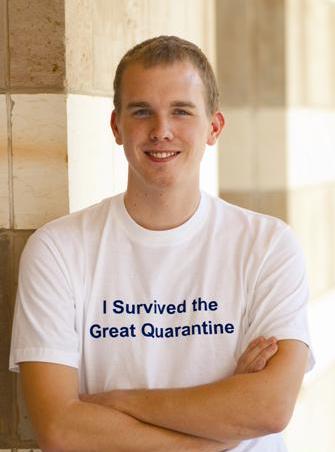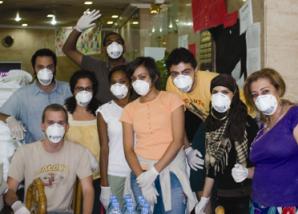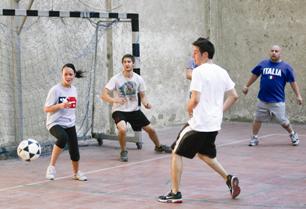
Jeffrey Bellis, photographed by Ahmad El-Nemr
|
|
Members of the AUC
community shared a special
bond at the Zamalek dorms
Writing and photography by Jeffrey Bellis, presidential intern at AUC’s Office of Communications and Marketing, reporting from inside the quarantine
Approximately 150 students, interns, staff and faculty members were under quarantine from June 8 to 15 at AUC’s Zamalek dormitory, after seven of its residents were diagnosed with the H1N1 virus. Egypt’s Ministry of Health imposed the ban in an attempt to contain the virus after tests for two residents turned out to be positive. The residents were American students who came to AUC as part of the Seton Hall Law School Summer Program for the Study of Law in the Middle East.
Dr. Suzanne Fouad, an AUC physician who works in the dormitory’s clinic several times a week, was on hand when one of the first two positive cases visited her for a diagnosis. Suspecting that the student had swine flu, she informed Dr. Mohamed Amin, AUC’s medical director, who consulted a hospital and then the Ministry of Health. The ministry tested
everyone in the dormitory because another resident had
arrived on the same plane as the 12-year-old Egyptian-American girl who represented the first case of swine flu in
Egypt.“We began to check the temperatures and perform
throat swabs on each resident,” said Fouad. |
|

Five new positive cases were confirmed when the test results returned a few days later. One was an AUC graduate student, and the rest were from the Seton Hall group. Tamiflu was administered
to everyone at the dorms as a preventive measure, and representatives from the U.S. Embassy and the Ministry of Health held an information session for dorm residents. The quarantine,
which was initially planned for 24 hours, was extended for a week. “When the test results came out and the Ministry of Health and Dr. Suzanne started communicating all the information, students began to calm down and accept the fact that they were stuck here for a week,” said Alexander Guindy, assistant manager of student housing and resident director.
Even before the extension of the quarantine, people inside the dorms collaborated together to make the most out of their stay. The dormitory’s director, resident directors and assistants, and the university’s presidential interns met to assess everybody’s critical needs. The first problem was providing food to nearly 150 people, so a 24-hour help desk and food station were set up in the lobby. Food was brought in daily from the Tahrir Square Campus, and, on some occasions, the Seton Hall program and AUC Trustee Moataz Al Alfi donated dinner. In addition, Mark Linz, director of AUC Press who was also part of the quarantine, donated 150 translated Arabic novels from his personal collection.
Because the quarantine was announced at night, one of the biggest challenges was that there were only six maintenance workers on duty. “The night shift is a much smaller number of people, and we could not let more cleaners enter the dorms because it would have extended the quarantine,” explained Atef Nada, director of the Zamalek dormitory. This led to the enlistment of security guards as extra cleaners. In addition, in the absence of laundry workers, maintenance staff took over operation of the laundry to provide clean sheets and towels.
“We were all supporting each other like a family,” said Fouad.
Joslyn Massengale, presidential intern at the Social Research Center, felt the same way. “I’m glad we all worked together to make this as painless as possible,” she said.
Some students recognized that the dormitory was short-staffed and took the initiative of cleaning some of the rooms and bathrooms themselves. A few students even volunteered their services, helping to serve food and answer questions at the help desk. Walid Beshr, a freshman from Yemen, was one of those students, and he noted that the situation improved as the days went by. “At first, everyone was scared by the news of their friends testing positive, but after the rest of the results came back negative, they were able to relax,” said Beshr. “The staff were worried because they could not see their families for a week, but then they adjusted.”
Shannon Mercer, a study-abroad student from Princeton University, said that she wasn’t worried upon hearing about the positive cases. “Medically, swine flu isn’t a huge problem, but I recognized the necessity of the weeklong quarantine,” she said. “It was unfortunate because it was the first week that we were all here [for the summer], but people treated us well.”
 To break up the monotony, soccer and basketball tournaments To break up the monotony, soccer and basketball tournaments
were held in the back courtyard, as well as yoga sessions, movie screenings and a handful of impromptu dance parties. A few students made light of the quarantine by editing the notice boards posted around the dorms, replacing “Ministry of Health” with “Ministry of Magic” in reference to the popular Harry Potter book series. In addition, a Tamiflu-themed karaoke song was created based on a suggestion by Samia Mehrez, professor of Arabic literature and a resident of the dorm, and was performed by students, staff and faculty during one of the terrace dinners.
Lynda Carr, another American study-abroad student, said that initially, the students were “frustrated with the situation, and everyone hung out within specific groups. The soccer tournament was a good way to get everyone together, as were the terrace dinners. People realized that we were stuck in this together,” she explained.
At the end of the quarantine, members of the AUC administration and community greeted students as they bounded out onto the streets of Cairo. However, some of the residents had mixed feelings. “I am happy to be able to explore Cairo, go to class and go outside,” said Mercer, “but I’m going to miss the bonding time that the quarantine provided.”
If you had known that you
would be quarantined for a
week and could bring one
thing in with you, what
would it be?
Playstation 3
Alexander Guindy
Assistant manager of student housing
and resident director
More books
Joslyn Massengale
Presidential intern
More books and a big Bernese
mountain dog
Shannon Mercer
American study-abroad student
My schoolbooks: Al-Kitaab II
Lynda Carr
American study-abroad student
One of my close friends
and Playstation 3
Walid Beshr
Freshman from Yemen
My kids
Dr. Suzanne Fouad
AUC physician
|
|